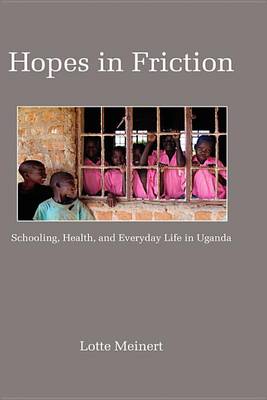Education Policy in Practice: Critical Cultural Studies
1 total work
A volume in Education Policy in Practice: Critical Cultural Studies Series Editors Bradley A. U. Levinson, and Margaret Sutton, Indiana University Hopes in Friction offers a vivid portrait of life and the implementation of Universal Primary Education in Eastern Uganda, based on longterm fieldwork following a group of children as they grow up. The book considers how the actions and hopes of these children and families, to attain what they perceive as 'a good life', are crosscut by political aspirations and projects of schooling and health education.When hopes are in friction inspiration as well as disappointment occur. Policy makers in Uganda and in international organisations expect health improvements as one of the bonuses of education programs. Families in Eastern Uganda also hope for and experience health - in the local sense of a good life - as part of schooling. Lotte Meinert explores the taken for granted effect of schooling on health and focuses a careful eye on how boys and girls appropriate and negotiate ideas and moralities about health in the context of what is possible ethically, materially and experientially. Endorsement: Hope in Friction gives us first-hand insight into the aspirations and ideals of Ugandan schoolchildren. Meinert shows us how local communities shape and reshape health education policies. Like two sticks rubbed together, top-down programs and bottom-up perceptions of wellbeing grate to produce sparks of hope. This work makes an important contribution to a growing literature on schooling in contemporary Africa. [Amy Stambach, author of Lessons from Mount Kilimanjaro: Schooling, Community, and Gender in east Africa] Amy Stambach, University of Wisconsin-Madison What do we learn when we go to school? Among other things, Lotte Meinert reminds us, children learn the bodily techniques of a hierarchical modernity: standing in lines, singing during parades, bending to be caned, sitting at desks. Within this frame, formal abstractions about health care in the eastern Ugandan primary school curriculum are not translated into domestic practice. Yet this lively and insightful book holds further surprises. School children do use their education-for example, to mediate for their parents with disrespectful health professionals. Hopes in Friction exemplifies the power of the anthropological gaze to move us outside the narrow confines of educational policy debates, allowing us to re-examine both the dead-ends and promises of schooling. Anna Tsing, University of California, Santa Cruz.
